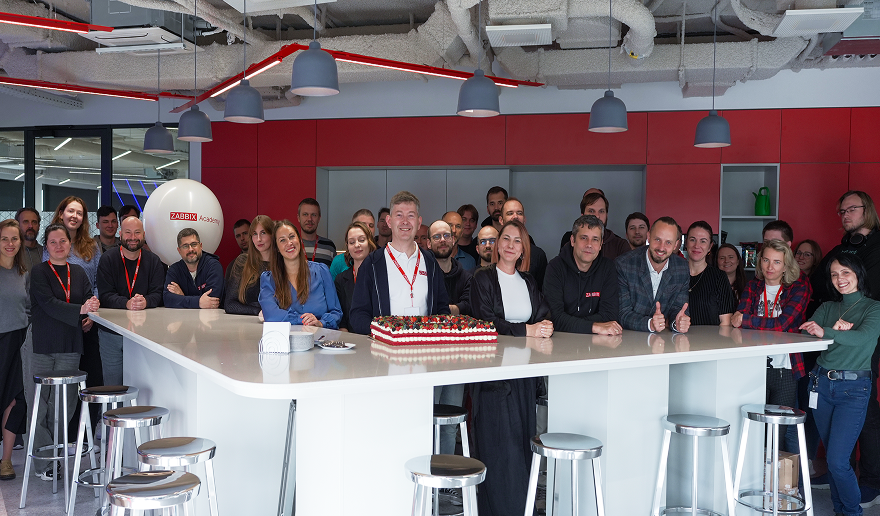If you’ve ever been part of a technical support team (or dealt with technical support as a customer, for that matter) you’re aware that there are as many different types of technical support teams as there are types of businesses.
However, there are a few best practices that all technical support teams share, no matter what industry they’re in. Read on to learn a bit more about them and see how our technical support team at Zabbix embodies each one.
Table of Contents
Offer omnichannel technical support
Omnichannel support is the practice of providing support across every touchpoint that a customer uses to interact with your business. It’s not to be confused with multi-channel support, where teams work in silos and have little or no interaction.
Omnichannel support provides a unified experience across different channels, including email, phone, live chat, in-app chat, etc. Customers can start a conversation on any channel, at any time, and pick it up from where they left off on any other channel, any other time. Businesses can keep all customer data in the form of contacts inside a single platform, so that their support representatives can address issues with the proper context.
The goal of our technical support service at Zabbix has always been to provide responsive, dependable, quality support to resolve any issues regarding the installation, operation, and use of Zabbix.
Our specialists also leverage their skills, experience, and proximity to the design and development teams pass along the kind of helpful hints, tips, and tricks that help customers get the most out of their Zabbix installation.
The backbone of our support delivery is the Zabbix Support System. Available to every Zabbix customer, it guarantees swift and easy communication between customers and our technical specialists.
Email and remote sessions can be used to communicate with Zabbix support at any time. Customers with our Global or Enterprise support tiers can access support services by phone or take advantage of on-site visits anywhere in the world by lead technical engineers.
No matter the channel, there’s no guesswork involved – all information is automatically entered into the support system to keep track of issues and resolutions.
Set realistic SLAs and stick to them
Service level agreements (SLAs) are critical to technical support performance. They help set clear expectations for both the service provider and the customer by outlining what services will be provided, how they will be delivered, and the expected level of performance. This gives everyone involved a clear understanding of what to expect, prevents any misunderstandings, and makes sure that the customer’s needs are being met.
SLAs also provide a way to measure the performance of the service provider. By defining metrics and targets, both parties can track the provider’s performance and make sure that they’re meeting the agreed-upon standards. This can help identify areas for improvement and provide a way to hold the service provider accountable if they don’t meet their obligations.
Here at Zabbix, we don’t just meet our SLAs – we exceed them by getting to the root cause of customer issues and providing extensive documentation with the aim of making sure they don’t happen again.
Our support goes far beyond the support of Zabbix as software – we do our best to support the whole monitoring infrastructure, which in some cases can even mean troubleshooting issues that are only tangentially connected to Zabbix as a monitoring system.
That might involve architecture questions, best practices in gathering data from one or another data source, or helping a customer understand and optimize some third-party scripts. No matter what the case may be, we do our best to help.
Listen to what customers need and communicate effectively
As anyone who’s ever contacted technical support knows, the best support isn’t necessarily provided by someone with genius level knowledge who understands every function of a product in minute detail.
For efficient technical support, communication skills are just as vital as technical knowledge. Specialists need to listen first, ask questions to confirm that they understand the problem, and restate what they’ve heard to give the customer the opportunity to provide more information. Above all, they need to speak to the customer’s level of understanding, avoiding jargon and needless details.
Our technical support team sees itself as a bridge between the customer’s needs and the solutions we provide. A key principle of technical support at Zabbix is the notion that the information our customers are sharing with us is precious. The way we see it, our customers give us valuable insights into what’s working in our product and what isn’t.
Listening carefully to the different support queries that we get allows us to form a complete feedback loop between our users and our solutions. For example, if our support team notices issues with collecting specific types of data or monitoring particular endpoints, they can prevent further queries by including a link to our FAQ section while our developers work to fix the issue.
Help customers help themselves
In technical support as in life, self-help is often the best help. It may seem illogical, but the best technical support is usually when the customer is either not asking for help or is able to help themselves.
Allowing customers to perform self-service saves them the time needed to call in or submit an online ticket, and it also improves turnaround time and serves them in the channel they prefer.
Giving customers the tools to be self-sufficient has been a part of our technical support philosophy at Zabbix from day one, and we’re fortunate to have a dedicated and devoted user community to help us do it.
Our users regularly post troubleshooting articles on our blog, and all official product documentation (including an extensive FAQ section) is available on our website. What’s more, our employees make a habit of sharing their knowledge on community Telegram channels, on-site and virtual meetups, and free webinars.
The official Zabbix forum is also a great place to go for support. Customers can interact with each other and get their problems solved easily. No matter what the issue, there’s a good chance that somebody somewhere has experienced it as well and may have a clever workaround or trick to share.
Self-help has limits, however. Your data and infrastructure are the core of your business, and some things are simply best left to experts. That’s why it’s a good idea to add to your knowledge via our official training sessions and have your most urgent issues taken care of by the skilled professionals on our support team.
Embrace automation where it makes sense to do so
Not all technical support tasks can or should be automated. Most require complex problem-solving, creativity, and emotional intelligence. Others are repetitive, simple, or predictable. It’s important to identify the best use cases for automation based on what the customer expects, the nature and value of the task, and what resources are available.
Our philosophy at Zabbix has always been that there’s no substitute for the human element when it comes to technical support. Our customers trust us to handle complicated, urgent, and sensitive issues, and there’s no substitute for the hands-on assistance that our support team can provide. It’s why we take great pains to make sure that all our team members display soft skills like interpersonal communication, personality traits, and social awareness.
However, we also harness the power of automation to assist with lower-level and more menial tasks, such as ticket assignment and processing counts. Thanks to automation, our specialists don’t need to manually grab tickets from a pool. Instead, everything is automated based on the calendar and who is working on a particular shift.
The ultimate goal is always the same – choosing the best automation path for the particular task at hand so that the customer’s issue gets resolved as quickly as possible with a minimum of disruption.
Conclusion
At Zabbix, we see our role as solving problems, not questions. 95.7% of our resolved support tickets receive positive reviews, and it’s because of the hard work, dedication, knowledge, and soft skills of our support team, as well as their goal of providing sustainable growth, long-term success, and measurable outcomes.
Our support team is a truly global entity that can provide round-the-clock support, and it’s made up of highly skilled Zabbix professionals, experts, and trainers who can boast years or even decades of Zabbix experience.
We offer multiple support tiers at a variety of price points, so you can be sure that no matter what the support needs of your organization happen to be, we have a plan that will fit perfectly.
Contact us to learn more and find the support tier that’s right for you.







 Prev Post
Prev Post 




